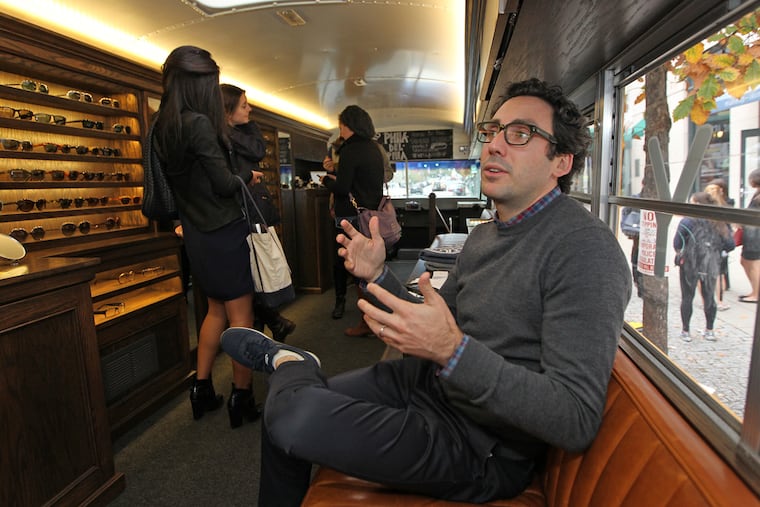Warby Parker plans IPO, looking to future growth in eyeglasses
Founded by two Wharton grads, the company's long-awaited public offering could happen this year. But it's not just about profits.

If any company does things differently, it’s Warby Parker, the Wharton-founded start-up that took on a monopolistic eyeglass industry by selling $95-and-up specs direct to consumers online.
In over a decade since its founding, Warby Parker has built up a portfolio of 145 stores to augment its big online presence and is on pace this year to surpass $500 million in sales. Soaring interest in other online retailers, such as Allbirds and StitchFix, likely helped prompt Warby Parker’s latest adventure: filing last week to go public.
And it’s not going the traditional IPO route either.
First difference? Warby Parker will list directly on the New York Stock Exchange, forgoing traditional support from investment bankers and the roadshow with investors.
Second difference: like Amazon, Warby Parker transitioned from online-only sales to opening its retail stores. That can help it appeal to an older demographic and build out a retail presence in addition to their direct-to-consumer business, said Michael Solomon, a marketing professor at St. Joseph’s University’s business school.
“They’re riding a few waves favorably -- the move to online shopping, and a category like eyewear was sitting there waiting to be improved. In addition, they’re an online pure play that moved to opening retail stores,” he said.
Others, like the beauty subscription firm BirchBox, “did that too, and it reflects the omni-channel retail reality we live in. You have to be where your customers are, and people want to go back to stores,” Solomon said. “From a pure marketing view, it’s really smart to stake a claim in both domains.”
The online boom has spurred investor interest in Philly start-up GoPuff, a food delivery business, recently valued at $15 billion, and Casper mattress seller, which went public last year.
It’s not clear when the Warby Parker IPO will begin trading. The company is still awaiting the U.S. Securities and Exchange Commission to complete its review, though it hopes to file sometime this year, listing its Class A common stock under the ticker symbol “WRBY.”
Another big difference? Warby Parker operates as a B-Corp., which means shareholders don’t always come first. The public interest is baked into their thinking. Indeed, under the glasses’ giveaway program, it says it has distributed eight million pairs free.
Investors should understand the implications of that. The company is “focused on positively impacting all stakeholders” as opposed to merely shareholders. According to their SEC filing, that means the company may make decisions that result in higher costs if it benefits the public good or local communities.
That has been their style so far. And it has worked pretty well. But it could get complicated.
Wharton grads
Warby Parker was founded in 2010 by four Wharton alums, two of whom stayed -- Neil Blumenthal and Dave Gilboa.
Now headquartered in New York City, the co-founders sell designer-quality prescription glasses and contacts. The company now offers eye exams and vision tests and has opened stores across the U.S. and Canada. In this region, its shops are on Walnut Street in Philadelphia and at the Suburban Square shopping area in Ardmore and the King of Prussia Mall.
Warby Parker also appeals to the Generation Z desire for a “double bottom line,” distributing a pair to someone in need with every purchase through their Buy a Pair, Give a Pair program. To date, Warby Parker has distributed more than eight million glasses to people in need.
“Gen Z business founders want to solve problems, and thank heaven that’s the case,” said Donna De Carolis, dean of Drexel University’s Close School of Entrepreneurship. “Whether it’s through a for-profit or a nonprofit or a B corporation, there are many ways to a successful start-up.”
The numbers
The eyeglass seller has posted stellar revenue growth, but hasn’t yet turned a profit.
Despite COVID-19, Warby Parker actually saw its share of sales through stores increase. Before the pandemic, it did 65% of its business in stores, the rest online. This year, even after the virus struck, the proportion sold in stores fell but then recovered to 50%.
In 2019, the firm’s sales surged to $371 million, a one-year jump of $100 million. But in 2020, growth slowed. Warby Parker posted sales of $394 million that year, reflecting a slowdown during the pandemic when the company closed some stores. The company broke even in 2019, but lost $22 million in 2018 and $55 million in 2020.
Still, it has rebounded this year. It sold $271 million in glasses in the first six months of 2021, a 54% increase over the same period the previous year. And losses for the half-year narrowed, from $10 million in 2020 to $7.3 million in 2021.
That lack of profitability is largely because Warby Parker spends heavily on marketing, “as they should. Otherwise they won’t be around for very long,” said St. Joe’s Solomon.
What’s the company worth? Most recently, its valuation was estimated at around $3 billion. To be sure, it is still far smaller than those dominant in the field, most notably international giant EssilorLuxottica, owner of LensCrafters and Pearle Vision. EssilorLuxottica is worth more than $70 billon.
Still, current investors in Warby Parker include plenty of venture capital and Wall Street firms.
Crunchbase data show that Warby Parker has raised a total of $536 million funding over nine rounds, the last in August of 2020. Backers include D1 Capital Partners and T. Rowe Price most recently.
Post-IPO, the two founders will have a controlling stake in the company, and can nominate all the directors, according to a filing with the SEC.
Blumenthal and Gilboa will be “able to control any action requiring the approval of our stockholders” and have the final say in mergers or sales of the firms in whole or part, according to the SEC filing.